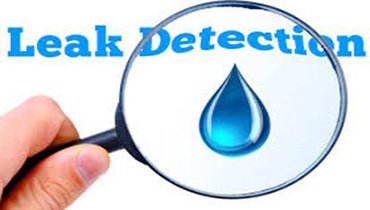
The best way to tackle a leaky pipe is by detecting it as early as possible. Today, most homes are built on concrete slab foundations which can make it quite difficult to detect a water leak at an early stage. Drywall will absorb moisture so stains caused by a water leak will take time to show up. But if you’ve noticed your water bill skyrocketed and you suspect a water leak in your home, you don’t have to tear up your property to get to your pipes and check them for leaks.
Professional Water Leak Detection Services
Here at VIP Sewer and Drain services we use thermal cameras to find hot water line leaks in your walls and Electronic Leak Detection equipment which makes it possible to pinpoint the location of a leak underneath your slab foundation. How? Water leaks, even very small ones, create some amount of noise with different sound frequencies determined by the pressure in the pipes. So even if you can’t hear it, an electronic leak detector can pick up these frequencies making it possible to detect a link in toilets, drains, water systems, pipes that transport steam or other liquids, such as oil.
Common signs of a hidden water leak include:
- Stained, damaged or sagging walls, ceiling or floors.
- Mold or mildew
- A sudden jump in your water bill
- Peeling or blistering paint or wallpaper
- A lingering, musty smell
If you suspect a leak, don’t wait‼️ Early water leak detection can prevent significant structural damage and expensive repairs.
Water leaks can be caused by many factors. Rapid temperature drops, root infestation, broken seals, clogged pipes or regular wear and tear can all contribute and cause your pipes to leak. Another factor that will determine your likelihood of detecting a water leak on your property is the type of pipes that are installed. The three most common types of pipes are: CPVC, Copper and PEX piping.
- CPVC – or chlorinated polyvinyl chloride, are plastic pipes that are excellent at withstanding high temperatures (they are fire resistant) and are a cost effective solution. They are non-toxic, resistant to chemicals and formation of biofilms, keeping your water purity intact.
- PEX – Cross-linked polyethylene is light weight and easy to install, making it a cost-effective solution. This material is more durable and has become a standard when it comes to house repiping. PEX piping is available in a variety of lengths, from short 10-foot pieces (for small repairs) to rolls over 500 feet long, which are used to install a home’s entire water supply system. PEX piping is color coded which makes it very easy to identify what the specific pipe is used for.
- Red PEX pipe carries hot water.
- Blue PEX pipe carries cold water.
- White + Gray PEX pipe can be used for either hot or cold water.
PEX piping is very flexible making it significantly easier to install than CPVC or Copper piping. With the correct fittings, PEX piping can be connected with existing lines. Because this material can expand it is more resistant to freeze-cracking and it does not corrode. The only draw-back of PEX piping is that it is sensitive to UV rays, making it non-suitable for outdoor use.

What are Pinhole Leaks
The State of California Task Force to Study Pinhole Leaks in Copper Plumbing defines a copper pinhole leak as “the perforation of copper tube, pipe or fittings used for domestic water distribution as the result of pitting corrosion initiated on the interior/waterside surface with the subsequent leakage of water.”
Internal pitting corrosion of copper pipes is a rare but costly problem that leads to the formation of pinhole leaks. Although the factors that cause this problem are mostly unknown, many professionals recognize that the chemistry of the water traveling through the pipes can influence the formation and propagation of pits.
A pinhole leak is a final breakthrough event of the progressive attack of pitting corrosion on copper water plumbing. A copper water plumbing system can be in a condition of having significant damage by pitting corrosion, but not have pinhole leaks. The challenge is how to discover pitting corrosion before pinhole leaks develop.
Although pinhole leaks could happen in any copper pipe or tube within a house, the Washington Suburban Sanitary Commission (WSSC) reported that the majority of pinhole leaks that their customers had reported were in cold-water, horizontal copper piping. Most of the leaks were in older homes, and 80 percent of the reports involved homes built prior to 1970.
Whole House Repipe
Unfortunately the pipes in your plumbing system do not last forever. Old, corroded, or leaky pipes can affect water quality and pressure—and put your home at risk for serious plumbing issues. Replacing sections of your pipes that seem to be the cause of constant problems may seem tempting. However, continuous patch up work can quickly add up and the reality may be that your home or business simply needs a whole repipe. Our whole house re-piping services replace outdated plumbing systems with new, durable materials like PEX or copper.
As we’ve mentioned above, PEX piping has become the standard for whole house repiping. You can expect to pay 60 – 70% less by choosing PEX over Copper piping. Not only is the actual material more cost-effective, it will take much less time to install, saving you costs on labor. On average a repipe can take as little as several days and up to a week, depending on your current plumbing system and the size of your property.
A house repipe can seem like a major hassle and it’s no secret that this is a big job that should be left to the capable hands of professionals who are not only experienced but also insured, and we guarantee high quality work. We handle every step of the process with minimal disruption to your daily routine.
Benefits of Re-Piping Your Home:
- Improved water pressure and flow
- Cleaner, better-tasting water
- Reduced risk of leaks and water damage
- Increased property value and plumbing reliability
We’ll inspect your plumbing, explain your options, and give you a detailed quote—no hidden fees, no high-pressure sales.
Why VIP Drain Services?
Local Experts: Based in Irvine, Orange County, we understand the unique plumbing challenges of Southern California homes.
24/7 Emergency Drain Cleaning: Plumbing emergencies don’t wait, and neither do we.
Licensed & Insured: Fully certified technicians you can trust.
Upfront Pricing: No hidden fees — just honest, transparent service.
Advanced Equipment: From hydro jetting to video camera inspections, we use cutting-edge tools to get the job done right.


